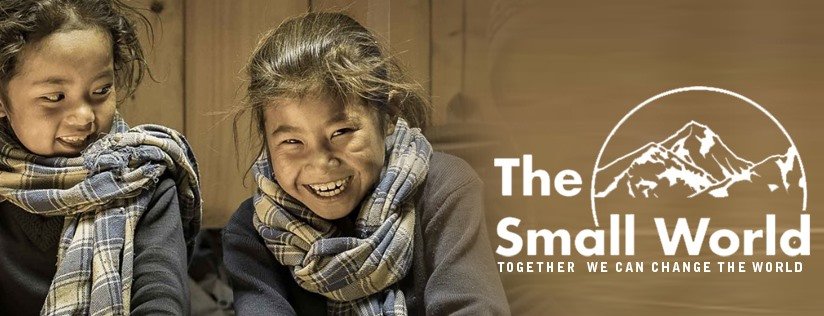First-ever menstrual hygiene campaign in Solukhumbu to reach 1000 women
The Small World’s Menstrual Hygiene Campaign girls
Menstrual Misinformation in Nepal
Did you know that when you get your period, you bleed from your forehead? And menstruating women cannot touch any fruit trees or crops, otherwise the fruits and vegetables will rot. Women on their periods also shouldn’t touch men, otherwise the men will get sick, or have bad luck. Heck, you shouldn’t even look at them!
While you’re on your period, you must go to a room with no windows or sunlight, and wait there until your bleeding stops. Under no circumstances can you go into your family’s kitchen (otherwise the god living there will be chased away) and you absolutely cannot go into a temple or place of worship, or participate in any religious activities. Not even on important festival days.
Across Nepal, such beliefs about periods are still common. In urban areas and among communities where education levels are higher, families might not fully believe in them, but for the majority of Nepalese women, their lives remain affected by these misconceptions.
Due to societal pressures to conform and have respect for old traditions, girls and women are sent away to relatives’ homes or even outbuildings or animal sheds for the duration of their periods. At best, this results in an uncomfortable and unpleasant time for them, but at its worst, these practices result in unsanitary conditions and exposure to threats like extreme temperatures, inhalation of smoke while trying to stay warm in winter, wild animal attacks or even attacks from sexual predators while women are separated from their families.
Inaugural menstrual hygiene event in Solukhumbu to reach 1000 women.
To combat the harmful effects of menstrual misinformation in our community, The Small World hosted the district’s first-ever Menstrual Hygiene Session in early May 2024. Held in the district capital, Salleri, speakers at the event armed attendees with facts about periods, while we also provided reusable cloth pads and information booklets to dispel myths about periods.
Fifty girls from across castes, ethnic groups and villages in Solukhumbu came together to participate in the day-long event, as well as community leaders from the District and Ward offices, and local schools. Participants received T-shirts with slogans like, ‘let’s talk periods,’ ‘normalize periods,’ ‘flow with pride’ and ‘taboo breaker,’ which they donned during an awareness rally through the town.
And we’re confident that the knowledge and momentum gained at this inaugural event won’t die down anytime soon. The 50 girls who received reusable sanitary pads and info booklets were challenged to become Menstrual Hygiene Ambassadors, and we look forward to seeing how they rise to the occasion! We’ve encouraged each of them to spread awareness to 20 people in their homes, schools, and communities. If each girl reaches out to 20 others, this means that the campaign has directly educated 1,000 individuals.
Finding their voices & blossoming leadership skills
It’s up to these Menstrual Hygiene Ambassadors how to conduct their programs since we feel it’s important for each individual to use their own initiative. This creates space for the girls to discover their strengths while developing their own leadership styles.
We hope that this kind of initiative will not only help girls to find their voices and speak up, but also embolden them to initiate conversations about and find solutions to issues in their communities. Already, we can see that girls involved in our programs are learning how to voice their concerns about matters affecting them and their communities.
When the floor was opened for event participants to voice their thoughts about the lack of period awareness and period taboos in Nepal, a group of Grade 11 girls performed a hard-hitting dramatic scene that almost every household in Nepal can relate to.
The enactment involved a traditional Nepalese family discussing what to do when their daughter gets her period for the very first time. In accordance with tradition, the father instructs his young daughter to go into the cow shed, but her mother feels it’s not right to do so. The father is anxious about what other community members will think if they don’t follow their society’s customs, and he also fears the wrath of the ancestors. “Why do you put societal pressures over your daughters' needs? She needs a clean place, good food, and comfort during her first period. Not being scared and alone,” the mother argues. The situation is resolved when a community health worker appears and educates the family with facts about menstruation, and the scene ends.
After the enactment performed by the Grade 11s, some senior high school students also put forward suggestions for how the government could improve hygiene for menstruating girls. Their ideas included building more period-friendly toilets in schools by, for instance, ensuring each school has toilets that are lockable from the inside, and providing adequate washing facilities.
Local leaders wowed by taboo-breaking session
One of the Menstrual Hygiene Session participants, the Chief District Officer of Solukhumbu, Devi Pande Khatri, said she’d never seen such a program. It was revolutionary for her, since she’d never openly discussed periods with anybody, never mind with a group of strangers. While she was recently posted in Solukhumbu for work, she grew up in the capital city, and even there she says, “If you ask someone about periods, they’ll tell you what they know in hushed tones. Whether the information is correct or not is a whole other story!”
Ms. Khatri also joined the day’s rally in Salleri, and said she’s very proud that The Small World is educating girls about this topic. She knows all too well how frightening and confusing it can be when you get your first period and you have no idea what’s going on. “When I got my first period, I was 12 years old and I was sent to spend those days alone in a cow shed. I was not allowed to see the sun. I finally emerged after 22 days, and then my period suddenly started again, so I had to go back into the shed.” Apparently the only thing she’d been told about menstruation at that time was a myth that she would bleed from her head. Until the day of the Menstrual Hygiene Session in Salleri, nobody had ever properly informed her about periods.
Another local leader who joined in the day’s activities was a school principal, Kanchi Sherpa. She also had no education about periods and no access to sanitary products. Apparently, she used old bed sheets and torn-up clothes as makeshift pads, and she wasn’t even allowed to dry her pads outside in the sun because the whole process of periods is so shameful and taboo. She shared that she’s suffered from infections due to a lack of hygiene, since she’s had to dry her home-made pads by the fire or in places that hardly get any sunlight.
On the day of the inaugural event, one male ward member also came to participate. He said that men knew even less about periods than the women did, but he was happy that he’d also been invited to learn. “Now that I know more, I can inform my sons and daughters about what to do.” He was shocked to hear of women having lifelong health problems from a lack of menstrual hygiene.
World Menstrual Hygiene Day approaches
We're thrilled to announce that our month-long Menstrual Hygiene awareness event was successfully concluded on 28th May 2024 on the International Menstrual Hygiene Day!
The event was inaugurated by the first-ever women chief district officer Mrs Devi Pandey Khatri in solukhumbhu a month ago and since then we have reached over 1000 people in the district.
Over 40 girls from TSW led awareness campaigns in their own villages and communities. Leading these period awareness campaigns empowered our girls to discover their leadership potential and be an inspiration, allowing them to take on important roles within their communities and promote menstrual health awareness.
For the final day event in Kathmandu over 40 students from diverse regions of Nepal and esteemed Buddhist nuns from Thrangu Tara Abbey Nunnery joined us in celebration.
Every participant committed to contribute to spreading awareness and normalizing period talk. Together, we emphasized the importance of creating a period-friendly Nepal through improved infrastructure and supportive policies. By fostering an environment where menstrual health is prioritized, we can ensure everyone flows with pride and dignity.
Let's continue to advocate for change and break the stigma around menstruation. Let’s make sure every girl has access to Menstrual Hygiene kits to manage her period. Thank you to everyone who participated and supported this cause!
This is not the end of our journey, we will continue to work and support with menstrual hygiene kits and awareness over the years to come.
JOIN US!
The sad reality in Nepal is that 1 girl out of 5 misses school due to a lack of menstrual hygiene products. We are committed to reaching 1000 girls with our menstrual hygiene campaign. For just $20, you can donate a menstrual hygiene kit that will last for a year and help make a difference. Join us in supporting girls’ education and health!
Namaste! and thank you.







